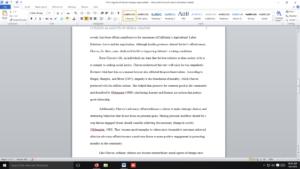Client Termination Summary
Question Description: Assignment 1: Practicum – Client Termination Summary (Due in Week 11)
Although termination is an inevitable part of the therapeutic process, it is often difficult for clients. However, by discussing termination throughout therapy, you can better prepare your clients for life without you. Once a client has achieved his or her therapeutic goals, termination sessions should be held and documented in a client termination summary. For this Assignment, you have the opportunity to practice writing a termination summary for a client with whom you have worked during your practicum experience.
Learning Objectives
Students will:
Develop client termination summaries
To prepare:
For guidance on writing a client termination summary, review pages 693–712 of Wheeler (2014) in this week’s Learning Resources.
Identify a client who may be ready to terminate therapy.
Assignment
With the client you selected in mind, address in a client termination summary (without violating HIPAA regulations) the following:
Identifying information of client (e.g., hypothetical name and age)
Date the client initially contacted therapist, date therapy began, duration of therapy, and date therapy will end
Total number of sessions, including number of missed sessions
Whether termination was planned or unplanned
Presenting problem
Major psychosocial issues
Types of services rendered (e.g., individual, couple/family therapy, group therapy)
Overview of treatment process
Goal status (goals met, partially met, unmet)
Treatment limitations (if any)
Remaining difficulties and/or concerns
Recommendations
Follow-up plan (if indicated)
Instructions for future contact
Signatures
Answer preview
Additionally, Chavez’s advocacy efforts influence a citizen to make strategic choices and embracing behaviors that do not focus on personal gains. Making personal sacrifices should be a step that an engaged citizen should consider achieving the necessary change in society (Oldenquist, 1980). They become good examples to others since the positive outcomes achieved after the advocacy efforts become a motivator factor to more positive engagement in promoting morality in the community.
Like Chavez, ordinary citizens can become extraordinary moral agents of change once they realize that their loyalty to the community is the beginning of being activists of change. However, they need to be courageous to overcome hostility from influential people who do not embrace equality. Kluger et al. (2007) demonstrate that moral dilemmas arise when promoting good, but regardless, irrational thinking should not be an option. Instead, this should motivate ordinary citizens to identify more rational ways of promoting change.
[695 Words]

Client Termination Summary

